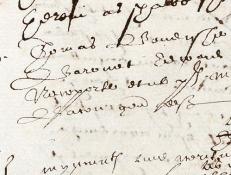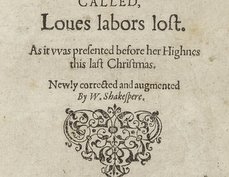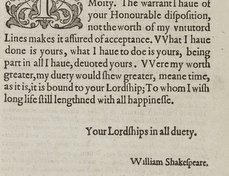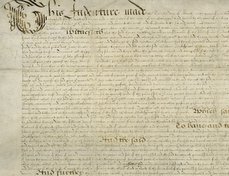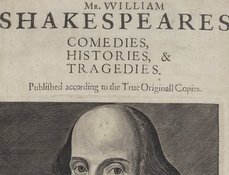Images reproduced by permission of The National Archives, London, England.
Terms of use
The National Archives give no warranty as to the accuracy, completeness or fitness for the purpose of the information provided.
Images may be used only for purposes of research, private study or education. Applications for any other use should be made to The National Archives Image Library, Kew, Richmond, Surrey TW9 4DU, Tel: 020 8392 5225 Fax: 020 8392 5266.
Document-specific information
Creator: Court of Chancery
Title: Bendish v Bacon
Date: April 26, 1615 and May 5, 1615
Repository: The National Archives, Kew, UK
Call number and opening: C 2/JasI/B11/9
View online bibliographic record
In 1613 William Shakespeare, with the assistance of three trustees, purchased the gatehouse in the Blackfriars neighborhood of London, evidently as an investment. As a new owner, Shakespeare was entitled to receive any and all legal instruments (or documents) associated with the property, including indentures of earlier purchases. Only by having all such instruments in his possession could an owner defend against rival claimants. But Shakespeare had acquired the gatehouse without its associated documents. In fact he was the fifth of six owners of Blackfriars properties who went to court with the very same problem on April 26, 1615. The document shown here includes both a Bill of Complaint and an Answer, two steps in the pleadings of a lawsuit. Both documents style Shakespeare as “gent.”
The Bill of Complaint, made on April 26, 1615, lists Shakespeare as one of many owners:
Sir Thomas Bendish Baronet Edward Newport and Willyam Thoresbie Esqr Robert Dormer Esquior and Marie his wife Willyam Shakespere gent and Richard Bacon Citezen of London
The complainants alleged that “Letters patentes Deedes Evidences Chartres munimentes and Wrightinges … were left in trust with Ann Bacon deceassed for and vnto the vse and behoofe of Your Orators,” and that the same legal instruments were now in the hands of Matthew Bacon, her son and sole executor.
The lawsuit was evidently a simple legal maneuver undertaken with friendly intent, as Brend acknowledged in his Answer, dated May 5, 1615:
this Defendant is and wilbe readie to deliver all such lettres patentes evidences
writinges and mynumentes concernynge the premisses as came to the custodie and
possession of this Defendant to his knowledge and doe of right belonge vnto the said
Complaynantes
Bendishe et al. v. Bacon provides incidental verification of William Shakespeare’s ownership of property in Blackfriars. Although the lawsuit does not explicitly name his acquisition in 1613 of Blackfriars gatehouse, it does reveal that Shakespeare took an active interest in his London property a year before his death in April 1616, an interest even more explicitly mentioned in his will.
[Transcriber’s note: “letters patents” is treated as a singular compound noun in legal documents.]
[Image 1: C 2/JASI/B11/9 (1) April 26, 1615: Bill of Complaint]
xxvjto die Aprilis 1615
Saunders
To the right Honorable Sir Thomas Egerton Knight
Lord Ellesmere and Lord Chancellor of England.
Humbly complaining, sheweth unto your Honorable Lordship your daily orators Sir Thomas Bendish Baronet, Edward Newport and William
Thoresby Esquire, Robert Dormer Esquire, ^and Marie his wife, and William Shakespeare gent., and Richard Bacon citizen of London. That whereas your orators be and are severally lawfully seised in their
demesne as of fee of and in one capital messuage or dwelling house with their appurtenances with two court yards and one void plot of ground
sometimes used for a garden on the east part of the said dwelling house, and so much of one edifice as now or sometimes served for two stables
and two hay lofts over the said stables, and one little coal house adjoining to the said stables lying on the south side of the said dwelling house
and of another messuage or tenement with the appurtenances now in the occupation of Anthony Thompson and Thomas Peakes(?) ^and of their assigns, and of a void piece of ground whereupon a stable is erected to the said messuage belonging and of several other houses divided
into several lodgings or dwelling houses, together with all and singular sellers, solars, chambers, halls, parlors, yards, backsides, easementes, profits, and
commodities thereunto severally belonging, and of certain void plots of ground adjoining to the said messuages and premises aforesaid or unto some
of them. And of a well house. All which messuages, tenements, and premises aforesaid be lying within the precinct of Blackfriars in the city of London
or County of Middlesex, late the messuages, tenements, and inheritances of William Blackwell the elder Henry Blackwell and William
Blackwell the younger, and of Ann Bacon, or of some or one of them, unto which foresaid capital messuages, tenements, and premises aforesaid
several deeds, charters, letters patents, evidences, muniments and writings be and are belonging and appertaining and do belong unto your orators and
do serve for the proving of your orators’ lawful right, title, interest, and estate in, to, and unto the foresaid messuages and premises. All which foresaid
letters patents, deeds, evidences, charters, and muniments, writings aforesaid, were left in trust with Ann Bacon deceased for and unto the use and
behoof of your orators. Now, so it is, may it please your honorable Lordship, that the said Ann Bacon being lately dead and Mathy Bacon being
her sole executor, the foresaid letters patents, deeds, charters, and evidences, muniments, and writings aforesaid be since her death come unto and now
be in the hands and possession of the aforesaid Mathey Bacon, who doth not claim any right, estate, or interest at all in or unto the foresaid
messuages or tenements, yet nevertheless the said Mathy Bacon, knowing the messuages, tenements, letters patents, deeds, evidences, charters, muniments,
and writings aforesaid to be belonging and only to belong to your orators, doth nevertheless withhold, keep, and detain away from your
orators the foresaid letters patents and other deeds, evidences, charters, muniments, and writings aforesaid, and will not deliver the same unto your
orators, whereby your orators be in great danger for to lose and be disinherited of the messuages, tenements, and premises aforesaid. In tender consideration
whereof, and for as much as your orators have no remedy at and by the course of the common laws of this realm, for to have the
said letters patents, deeds, charters, muniments, evidences, and writings delivered unto your orators, for that your orators do not know the certain
dates nor particular contents of them, nor whether they be in box, bag, or chest sealed or locked. Therefore that the said Mathy Bacon
may make direct answer unto the premises, and may set down expressly what letters patents, deeds, evidences, charters, muniments, or
writings he hath in his hands, or knoweth where they be, which concern your orators, or the messuages and premises aforesaid, or any of
them, and the same may bring into this honorable court to be delivered unto your orators. May it please your Lordship to grant to your orators his Majesty’s
most gracious writ of subpoena, and also of ducens tecum, unto him the said Matthew Bacon to be directed, commanding him thereby at a certain
day and under a certain pain therein to be limited, personally to be and appear before your Lordship in his Majesty’s High Court of Chancery, then and
there for to make answer unto the premises, and also to bring with him the said letters patents, deeds, evidences, charters, and writings into this honorable
court, and to stand to and abide such further order therein as to your honorable Lordship shall be thought fit. And your Lordship’s daily orators shall be in all duty
bound to pray for your good Lordship in all health and happiness long to continue.
Lock
[Image 1: C 2/JASI/B11/9 (2) May 5, 1615: Answer]
Juratus 5 Maij 1615 Mat: Carew
Pennyman
The answer of Mathy Bacon gent., defendant, to the bill of complaint of Sir Thomas Bendish baronet,
Edward Newport esquire, William Thoresby esquire, Robert Dormer esquire and Mary his wife, William
Shakespeare, gent., and Richard Bacon citizen of London, complainants.
The said defendant, saving to himself now and at all times hereafter all advantage and benefit of exception to all and every the
incertainties and insufficiencies of the said bill of complaint, saieth that he thinketh it to be true, that the said complainants are
lawfully and severally seised in their demesne as of fee, of and in one capital messuage or dwelling house with the appurtenances, and other
the tenements, stables, edifices, and void grounds mentioned in the said bill of complaint, and likewise thinketh it to be true
that the same were late the messuages, tenements, and inheritances of William Blackwell the elder, deceased, Henry Blackwell,
and William Blackwell the younger, and of Anne Bacon deceased, mother of the said defendant, or of some of them. And this defendant further
saith that he doth not now claim to have any estate, right, title, or interest of, in, or to the said premises, or any part or parcel
thereof. And he also saith that one letters patents and certain deeds, evidences, writings, and muniments concerning the said messuages
tenements, and other the premises mentioned in the said bill of complaint, or some of them, are come to the custody and possession of this
defendant as executor unto the said Anne Bacon his mother. But this defendant denieth that the said letters patents, evidences, writings, and
muniments, or any of them, were left in trust with the said Anne Bacon for and to the use and behoof of the said complainants, or any of
them, to the knowledge of this defendant, in any such manner as in the said complainants’ bill is set forth and alleged. And this defendant
further saith, that he doth not certainly know whether the said letters patents, evidences, writings, and muniments,
do only belong unto the said complainants, or any of them, or to any other person or persons, as well as to the said complainants.
And therefore he this defendant hath detained the same until such time as he may be lawfully and orderly discharged thereof upon
his delivery of the same. And so as he may be discharged and saved harmless from all further trouble, charge, and damage, which may
hereafter happen unto him for or concerning his possession of the said letters patents, deeds, evidences, writings, and muniments,
he this deponent is and will be ready to deliver all such letters patents, evidences, writings, and muniments concerning the premises
as came to the custody and possession of this defendant, to his knowledge, and do of right belong unto the said complainants or any
of them, unto such person or persons and in such sort as this honorable court shall order and think meet; without that that any
other matter or thing in the said bill of complaint mentioned material or effectual in law to be answered unto.
And herein before not sufficiently answered unto, confessed, and avoided, traversed, or denied is true. All which this
defendant is and will be ready to aver, maintain, and prove as this most honorable court shall award. And
humbly prayeth to be dismissed forth of the same, with his reasonable costs and charges in this behalf most wrongfully
sustained.
Blakwell
[This transcription is pending final vetting]
[Transcriptions based on B. Rowland Lewis, Shakespeare Documents, ii, 467-71.]
[Image 1: C 2/JASI/B11/9 (1) April 26, 1615: Bill of Complaint]
xxvjto die Aprilis 1615
Saunders
To the Right Honorable Sir Thomas Egerton knight
Lord Ellesmere and Lord Chancellor of England
Humblie Complayninge sheweth Vnto your Honorable Lordship your Daylie Oratores Sir Thomas Bendish Baronet Edward Newport and Willyam
Thoresbie Esqr Robert Dormer Esquior and Marie his wife Willyam Shakespere gent and Richard Bacon Citezen of London That Whearas Your Orators be and are seuerallye Lawfullie Seised in there
demesne as of ffee of and in One Capitall Messuage or Dwellinge howse with there appurtenances with two Court Yardes and one void plot of grownd
sometymes vsed for a garden on the East parte of the said dwellinge howse and so much of one Edifice as now or sometymes served for two Stables
and two haye Loftes over the said Stables and one litle Colehowse adioyninge to the said Stables Lyinge on the South side of the said Dwellinge howse
And of another Messuage or Tenemente with thappurtenances now in the occupacion of Anthony Thompson and Thomas Perckes ^and of there assignes & of a void peece of grownd whervppon a Stable is builded to the said Messuage belonging and of seuerall othere howses devided
into seuerall Lodginges or Dwellinge howses Together with all and singuler Sellors Sollers Chambers Halls parlors Yardes Backsides Easementes profites and Comodityes Hervnto seuerallie belonginge And of Certain Void plots of grownd adioyninge to the said Messuages and premisses aforesaid or vnto some
of them And of a well howse All which messuages Tenements and premisses aforesaid be Lyinge within the precinct of Black ffriers in the Cittye of London
or Countye of Middlesex late the Messuages Tenementes and enheritances of Willyam Blackwell thelder Henrie Blackwell and Willyam
Blackwell the Younger of Ann Bacon or of some or one of them Vnto which foresaid Capitall Messuages Tenementes and premisses aforesaid
seuerall deedes Chartres Letters patentes Evidences Munimentes and Wrightinges be and are belonginge and appurteyninge and do belonge vnto Your Orators and
doe serve for the provinge of Your Orators Lawfull right title interest and estate in to and vnto the foresaid Messuages and premisses All which foresaid
Letters patentes Deedes Evidences Chartres munimentes and Wrightinges aforesaid were left in trust with Ann Bacon deceassed for and vnto the vse and
behoofe of Your Orators Now so Yt is May Yt please Your Honorable Lordship: that the said Ann Bacon beinge latelie Dead and Mathy Bacon beinge
her sole executor the foresaid Letters patentes Deedes Chartres and Evidences Munimentes and Wrightinges aforesaid be since her Death come vnto and now
be in the handes and possession of the foresaid Mathy Bacon who doth not Clayme any right estate or interest at all in or vnto the foresaid
messuages or Tenementes Yet neuertheles the said Mathy Bacon Knowinge the Messuages Tenementes Letters patentes Deedes Evidences Chartres Munimentes
and wrightinges aforesaid to be belonging and onelie to belonge to Your Orators Doth neuertheles Withhould keepe and Deteyne awaye from Your
Orators, the foresaid Letters patentes and other Deedes Evidences Chartres Munimentes and Wrightinges aforesaid and will not deliuer the same vnto Your
Orators Wherby Your Orator, be in great Danger for to Loose and be Disinherited of the messuages Tenementes and premisses aforesaid In tender Consideracion
Wherof and forasmuch as Your Orators have no remoudye at and by the Course of the Common Lawes of this Realme for to have the
said Letters patentes Deedes Chartres Munimentes Evidences and Wrightinges Deliuered vnto Your Orators for that Your Orators Doe not knowe the Certaine
dates nor particuler Contentes of them nor Whither they be in Box Bag or Chist sealed or Locked Therfore that the said Mathy Bacon
maye make Direct Answere vnto the premisses and maye set Downe expresslie what Lettres patentes Deedes Evidences Chartres munimentes or
Wrightinges he hath in his handes or knoweth where they be which Concerne Your Orators or the Messuages and premisses aforesaid or any of
them and the same maye bringe into this Honorable Court to be deliuered vnto Your Orators Maye Yt please your Lordship to grant to Your Orators his Maiestes
most gracious writt of Subpena and also of Ducens tecum vnto him the said Mathew Bacon to be Directed Commandinge him therby at a Certaine
daye and vnder a Certaine payne therein to be Lymited Personallie to be and appeare before Your Lordship in his Maiestes high Court of Chancerie then and
there for to make Answere vnto the premisses and also to bring with him the said Letters patentes Deedes Evidences Chartres and Wrightinges into this Honorable
Court and to stand to and abide such further Order therin as to your Honorable Lordship shalbe thought fitt And your Lordships Daylie Orators shalbe in all Dewtye bo
Bownd to pray for your good Lordship in all health and happines long to Contynue. Lock
[Image 1: C 2/JASI/B11/9 (2) May 5, 1615: Answer]
Juratus 5 Maij 1615 Mat: Carew
Pennyman
The answeare of Mathye Bacon gent defendant to the bill of complaynte of Sir Thomas Bendish Baronett
Edward Newport esqr William Thoresbye esquier Robert Dormer esquier and Mary his wife William
Shakespeare gent and Richard Bacon Citizen of London Complainantes.
The said defendant savinge to himselfe nowe and all tymes hereafter all advantage and benefitt of excepcion to all and every the
incertenties & insufficiencies of the said bill of complaynte saieth that hee thinketh it to be true that the said Complainantes are
lawfullye & severally seised in theire demesne as of fee of and in one capitall messuage or dwellinge house with thappurtenances and other
the tenementes Stables edefices and voide groundes mencioned in the said bill of complaynte and likewise thinketh it to be true
that the same were late the messuages tenementes and inheritances of William Blackwell the elder deceased Henry Blakwell
and William Blakwell the yonger and of Anne Bacon deceased mother of the said defendant or of some of them And this defendant further
saieth that hee doth not nowe clayme to haue any estate right title or interest of in or to the said premisses or any parte or parcell
thereof And hee also saieth that one lettres patentes and certeyne deedes evidences writinges and mynumentes concernynge the said messuages
tenementes and other the premisses mencioned in the said bill of complaynte or some of them are come to the custodie & possession of this
defendant as executor vnto the said Anne Bacon his mother But this defendant denieth that the said lettres patentes evidences writinges and
mynumentes or any of them were left in trust with the said Anne Bacon for and to the vse and behoofe of the said Complaynantes, or any of
them to the knowledge of this defendant in any such manner as in the said Complainantes bill is sett forth and alledged And this defendant
further saieth that hee doth not certeynelie knowe whether the said lettres Patentes evidences writinges and mynumentes
doe onlie belonge vnto the said Complaynantes or any of them or to any other person or persons aswell as to the said Complainantes.
And therefore hee this defendant hath deteyned the same vntill suchn tyme as hee may be lawfully and orderlie discharged thereof vpon
his deliuerie of the same And soe as hee may be discharged and saved harmles from all further trouble charge and damage which maie
hereafter happen vnto him for or concernynge his possession of the said lettres patentes deedes evidences writinges and mynumentes
hee this defendant is and wilbe readie to deliver all such lettres patentes evidences writinges and mynumentes concernynge the premisses
as came to the custodie and possession of this defendant to his knowledge and doe of right belonge vnto the said Complaynantes or any
of them, vnto such person or persons and in such sorte as this honorable Court shall order and thinke meete without that that anie
other matter or thinge in the said bill of complaynte mencioned materiall or effectuall in lawe to be answeared vnto
And herein before not sufficiently answeared vnto confessed and avoyded traversed or denied is true All which this
defendante is and wilbe readie to averre maynteyne and prooue as this most honorable Court shall awarde And
humblie prayeth to be dismissed forth of the same with his reasonable costes and charges in this behalfe most wrongfully
susteyned.
Blackwell
Written by Alan H. Nelson
Sources
E.K. Chambers, William Shakespeare: A Study of Facts and Problems, vol. 2 (Oxford: Clarendon Press, 1930) 159-161; 164-164.
B. Roland Lewis, The Shakespeare Documents: Facsimiles, Transliterations, Translations and Commentary, vol. 2 (Stanford University, California: Stanford University Press, 1940), 467-71.
Samuel Schoenbaum, William Shakespeare: A Documentary Life (New York: Oxford University Press, 1975), 223-4.
David Thomas, Shakespeare in the Public Records (London: H.M.S.O., 1985), 38.
Last updated August 9, 2018



